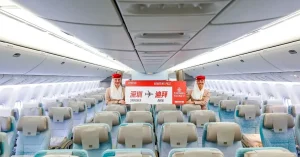The travel payments industry is undergoing a profound transformation, driven by the rise of fintech, evolving consumer preferences and changing market dynamics.
A 2023 white paper by Mastercard, titled “Embracing a virtual future of B2B travel payments”, explores these transformations and their impact on the sector.
The paper discusses how the pandemic has triggered a reevaluation of business-to-business (B2B) payment practices, the growing prominence of the merchant of record (MoR) payment model, and the increasing adoption of virtual cards.
Traditionally, travel agencies mainly served as intermediaries, transmitting consumer payment details to various service providers in an individual’s travel itinerary. However, the expanding network of suppliers has made this “pass-through” approach riskier and more cumbersome for both agencies and consumers.
To address these risks, an increasing number of travel agencies are shifting to the MoR model where the travel agency collects customer payments for all booked services, authorizes transactions, and then disburses payments to the specific suppliers associated with the booking.
The MoR model not only addresses these challenges but also opens up new opportunities for suppliers, allowing agencies to offer consumers new payment options such as installment methods and buy now, pay later (BNPL) arrangements.
The report notes a significant migration from the pass-through model to the MoR model, with travel agents acting as MoRs posting a compound annual growth rate (CAGR) of 43% from 2020 to 2022, a growth rate that’s more than double than that of the overall online travel agency market of 20% CAGR.
Another trend outlined by the Mastercard white paper is the digitalization of business-to-business (B2B) travel payments, with virtual cards in particular emerging as an appealing payment option. Virtual cards are essentially digital versions of physical payment cards. Virtual card numbers are digitally generated, PCI-compliant and single-use card numbers that are accepted everywhere traditional payment cards are.
According to Mastercard, virtual cards provide a unique, traceable link between booking and associated payments to third-party suppliers. They allow travel agencies and suppliers to easily track and reconcile payments, while offering benefits such as flexible pricing, financing options and card payment guarantees.
This results in a more streamlined payment experience for travel agencies and their customers, as well as travel suppliers. Transactions are also more secure, with Mastercard data revealing that the risk of fraud is 30 times lower when using virtual cards compared to traditional payment cards.
A 2023 infographic produced by Up in the Air, a travel payment consultancy from the Netherlands, depicts a dynamic and diversified B2B travel payment landscape.
This landscape comprises popular payment card schemes such as Visa, Mastercard and American Express; virtual card issuers such as banks; payment technology companies such as Stripe, Nium and Airwallex; as well as travel payment pure players such as Outpayce, a B2B payments business serving the travel industry, Mystifly, an airfare distribution and payments settlement marketplace platform, and iOL Pay, an automated payment acceptance solutions for the hospitality industry.
Source: Fintech News.






